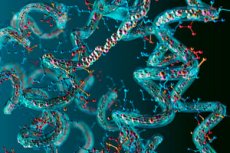New publications
Statins may block an inflammatory pathway involved in cancer development
Last reviewed: 02.07.2025

All iLive content is medically reviewed or fact checked to ensure as much factual accuracy as possible.
We have strict sourcing guidelines and only link to reputable media sites, academic research institutions and, whenever possible, medically peer reviewed studies. Note that the numbers in parentheses ([1], [2], etc.) are clickable links to these studies.
If you feel that any of our content is inaccurate, out-of-date, or otherwise questionable, please select it and press Ctrl + Enter.

A new study by researchers at the Massachusetts General Cancer Center, a core member of the Mass General Brigham Health System, shows that statins — widely used cholesterol-lowering drugs — may block a specific pathway involved in the development of cancers driven by chronic inflammation. The findings are published in the journal Nature Communications.
“Chronic inflammation is a major cause of cancer worldwide,” said senior author Sean Demery, MD, PhD, a principal investigator in the Center for Cancer Immunology and the Center for Skin Research at Massachusetts General Hospital and an associate professor of dermatology at Harvard Medical School. “We examined the mechanism by which environmental toxins trigger the onset of chronic inflammation that predisposes to skin and pancreatic cancer,” says Demery, who is also a Bob and Rita Davis Family MGH Research Scholar 2023-2028. “Additionally, we investigated safe and effective treatments to block this pathway to suppress chronic inflammation and its cancer-causing consequences.”
The study by Demery and colleagues relied on cell lines, animal models, human tissue samples, and epidemiological data. The cell experiments showed that environmental toxins (such as allergens and chemical irritants) activate two interconnected signaling pathways called TLR3/4 and TBK1-IRF3. This activation leads to the production of a protein called interleukin-33 (IL-33), which stimulates inflammation in the skin and pancreas, which may contribute to cancer development.
In a screening of a library of FDA-approved drugs, the researchers found that the statin pitavastatin effectively suppressed IL-33 expression by blocking activation of the TBK1-IRF3 signaling pathway. In mice, pitavastatin suppressed environmental inflammation in the skin and pancreas and prevented the development of inflammatory pancreatic cancers.
In human pancreatic tissue samples, IL-33 was overexpressed in samples from patients with chronic pancreatitis (inflammation) and pancreatic cancer compared with normal pancreatic tissue. Also, in an analysis of electronic health record data from more than 200 million people in North America and Europe, pitavastatin use was associated with a significantly reduced risk of chronic pancreatitis and pancreatic cancer.
The results suggest that blocking IL-33 production with pitavastatin may be a safe and effective preventive strategy for suppressing chronic inflammation and the subsequent development of certain cancers.
"Our next step is to more closely examine the effects of statins on preventing cancer development in the setting of chronic inflammation in the liver and gastrointestinal tract and identify other new therapeutic approaches to suppress chronic inflammation that predisposes to cancer," Demery said.
